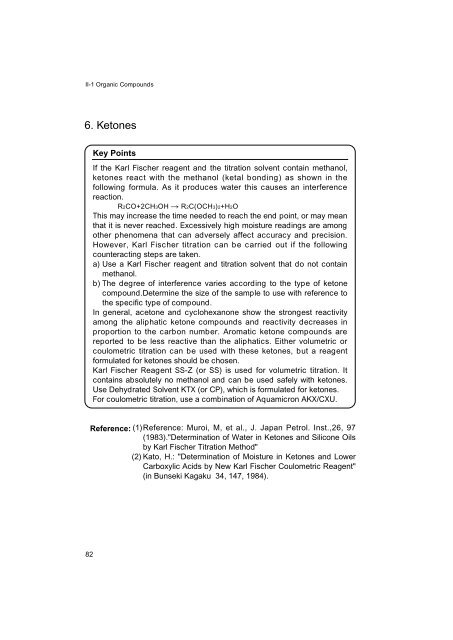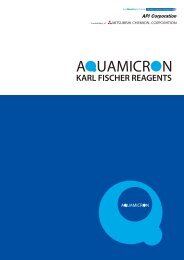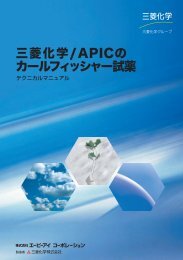Development of Karl Fischer Reagents
Development of Karl Fischer Reagents
Development of Karl Fischer Reagents
You also want an ePaper? Increase the reach of your titles
YUMPU automatically turns print PDFs into web optimized ePapers that Google loves.
II-1 Organic Compounds<br />
6. Ketones<br />
82<br />
Key Points<br />
If the <strong>Karl</strong> <strong>Fischer</strong> reagent and the titration solvent contain methanol,<br />
ketones react with the methanol (ketal bonding) as shown in the<br />
following formula. As it produces water this causes an interference<br />
reaction.<br />
R2CO+2CH3OH � R2C(OCH3)2+H2O<br />
This may increase the time needed to reach the end point, or may mean<br />
that it is never reached. Excessively high moisture readings are among<br />
other phenomena that can adversely affect accuracy and precision.<br />
However, <strong>Karl</strong> <strong>Fischer</strong> titration can be carried out if the following<br />
counteracting steps are taken.<br />
a) Use a <strong>Karl</strong> <strong>Fischer</strong> reagent and titration solvent that do not contain<br />
methanol.<br />
b) The degree <strong>of</strong> interference varies according to the type <strong>of</strong> ketone<br />
compound.Determine the size <strong>of</strong> the sample to use with reference to<br />
the specific type <strong>of</strong> compound.<br />
In general, acetone and cyclohexanone show the strongest reactivity<br />
among the aliphatic ketone compounds and reactivity decreases in<br />
proportion to the carbon number. Aromatic ketone compounds are<br />
reported to be less reactive than the aliphatics. Either volumetric or<br />
coulometric titration can be used with these ketones, but a reagent<br />
formulated for ketones should be chosen.<br />
<strong>Karl</strong> <strong>Fischer</strong> Reagent SS-Z (or SS) is used for volumetric titration. It<br />
contains absolutely no methanol and can be used safely with ketones.<br />
Use Dehydrated Solvent KTX (or CP), which is formulated for ketones.<br />
For coulometric titration, use a combination <strong>of</strong> Aquamicron AKX/CXU.<br />
Reference:<br />
(1)Reference: Muroi, M, et al., J. Japan Petrol. Inst.,26, 97<br />
(1983)."Determination <strong>of</strong> Water in Ketones and Silicone Oils<br />
by <strong>Karl</strong> <strong>Fischer</strong> Titration Method"<br />
(2) Kato, H.: "Determination <strong>of</strong> Moisture in Ketones and Lower<br />
Carboxylic Acids by New <strong>Karl</strong> <strong>Fischer</strong> Coulometric Reagent"<br />
(in Bunseki Kagaku 34, 147, 1984).




